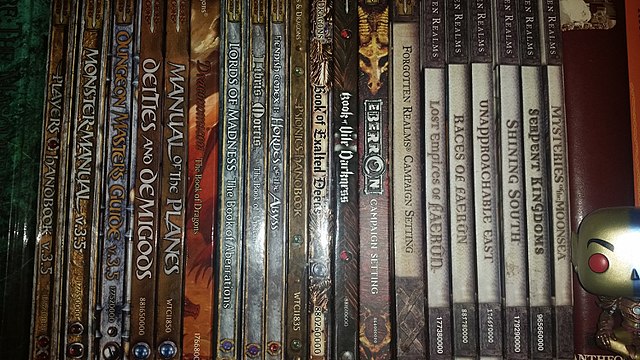What is Dungeons and Dragons?
Dungeons and Dragons, or D&D for short, is a tabletop RPG where the core is storytelling and the goal is having fun. You create your own character with their own backstory as you tell a story with friends led by your storyteller, the dungeon master. The game is played using dice to determine the fate of your character, the higher you roll the more likely you are to succeed. Recently there has been a rise of popularity as more people are learning about D&D as it is making appearances online in trends and tv series.

D&D goes way back. It was originally invented in 1972 by two friends in one of their basements before they were able to self publish the first edition through publishing company TSR (Geek & Sundry). The game has gone down a rocky road, not gaining popularity for a long time before being simply associated with the geek that was bullied by just about anyone. Now the game is officially in its 5th edition and players generally don’t need to worry about getting called names for mentioning they bought a set of dice.
D&D in Pop Culture
A big boost of the game’s newfound popularity was its appearance in the hit series ‘Stranger Things’. From the first episode, D&D plays a role in the plot of the series as the main characters talk about the monster they are dealing with as if it is a monster from the game. A year prior to Stranger Things, another popular series of D&D started, namely Critical Role. The show started in early 2015 and quickly gained popularity. A group of voice actors led by Matthew Mercer play D&D together live on Twitch. The show is still going on and gaining popularity now, as their first campaign is soon launching as an animated show on Amazon Prime. Besides the big names, there are also countless podcasts up and coming that feature D&D and related tabletop RPG games. All these forms of digital entertainment have helped D&D gain popularity and moved it from a game that only the geeks play to being more known as a fun and creative hobby.
There are, as always, people who try to gatekeep the game. Mostly these are players who have been playing for many years who are somehow angry that players no longer get poked fun at for playing the game. Another reason why longer-term players have been getting perturbed is the freedom that newer players seem to take in their characters. The game itself states that anything is possible and that it truly means anything, but some players cannot imagine a 900 years old mystical fantasy elf could be a lesbian, have darker skin, or have a disability.
D&D Resources
The original source for D&D is the official books with The Player’s Handbook, often just referred to as the PHB, as the base rulebook. For 5th edition, there are already tens of sourcebooks that you can decorate your bookshelves with and even more official campaigns you can play. With the growth in popularity, the game has kept pace with technological advancements as well. While Wizards of the Coast still officially owns the game itself and its sourcebooks, there is now also the website of DnD Beyond. The website sells sourcebooks in digital format and lets you create characters online. That way you aren’t sat on your floor with multiple books surrounding you, pencil in hand, as you compare all your material and build yourself a new character to play. Instead, the website knows exactly what options are available for you and for example what spells and weapons your 900 years old elf can wield. DnD Beyond has made D&D even more accessible for new players with their character builder, easy to find resources, and free access to the base rules.
Playing Online
As you can imagine, you do need people to play this game with and it’s not always easy to find them. This is where Roll20 comes in. Roll20 is an international, digital community where you can host and join campaigns and play D&D online. It lets you have maps so you can see where players and enemies are in battle or what the dungeons you’re exploring looks like. Roll20 makes the game accessible for players who don’t have enough friends who live nearby by allowing them to play in a virtual environment instead. I have used Roll20 to play with a group of friends who live all over Europe and it was a lifesaver. You can start a closed campaign on it so you can share it and play specifically with your friends, but you can also post an open campaign and look for new people to play with or you can join an open campaign and meet new people that way.
Digital media and spaces have helped D&D immensely by making it more accessible for players all around the world and by doing so it’s no longer seen as just for geeks. If you’ve never played D&D before and would love to learn more, check out Critical Role on Twitch and YouTube as they have just started a new campaign. Another fun resource is Geek & Sundry on YouTube, they have lots of videos for new players on how to play and what to do.
Sources:
The Story of D&D Part One: The Birth, Death, and Resurrection of Dungeons & Dragons, Ben Riggs. https://geekandsundry.com/the-story-of-dd-part-one-the-birth-death-and-resurrection-of-dungeons-dragons/


Recent Comments